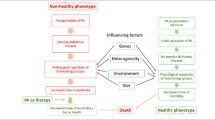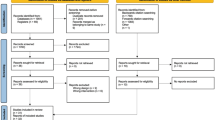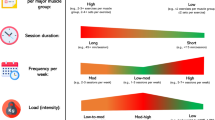Abstract
Regular physical activity (PA) is essential for secondary and tertiary prevention of cardiometabolic risk factors and disease, but low adherence to PA recommendations is common. Motivational communication (MC) represents a collection of evidence-based behavior change strategies drawn from motivational interviewing, cognitive-behavioral techniques, and behavior change theories that show promise for promoting PA adherence. However, dissemination of MC strategies in cardiometabolic healthcare settings has been limited by inconsistent reporting of training fidelity in intervention research, making it unclear how to optimally train healthcare providers. We discuss preliminary considerations for training individuals in the use of MC, including: being relatively intensive with more than self-directed learning, covering an array of behavior change strategies, offering ongoing mentorship and support, and being delivered by a skilled trainer who addresses diverse trainee needs. Future work is needed to expand upon these considerations and establish what constitutes competent MC training to impact cardiometabolic health outcomes.
Similar content being viewed by others
References
Papers of particular interest, published recently, have been highlighted as: • Of importance
World Health Organization. Global status report on noncommunicable diseases 2010. Geneva; 2011.
Boulé NG, Haddad E, Kenny GP, Wells GA, Sigal RJ. Effects of exercise on glycemic control and body mass in type 2 diabetes mellitus: a meta-analysis of controlled clinical trials. J Am Med Assoc. 2001;286(10):1218–27. doi:10.1001/jama.286.10.1218.
Katzmarzyk PT, Church TS, Janssen I, Ross R, Blair SN. Metabolic syndrome, obesity, and mortality impact of cardiorespiratory fitness. Diabetes Care. 2005;28(2):391–7.
Roque FR, Hernanz R, Salaices M, Briones AM. Exercise training and cardiometabolic diseases: focus on the vascular system. Curr Hypertens Rep. 2013;15(3):204–14. doi:10.1007/s11906-013-0336-5.
Clark AM, Hartling L, Vandermeer B, Mcalister FA. Meta-analysis: secondary prevention programs for patients with coronary artery disease. Ann Intern Med. 2005;143:659–72.
Oldridge NB, Guyatt GH, Fischer ME, Rimm AA. Cardiac rehabilitation after myocardial infarction: combined experience of randomized clinical trials. J Am Med Assoc. 1988;260(7):945–50.
Pescatello LS. ACSM’s guidelines for exercise testing and prescription. 9th ed. Philadelphias: American College of Sports Medicine; 2013.
Garber CE, Blissmer B, Deschenes MR, et al. Quantity and quality of exercise for developing and maintaining cardiorespiratory, musculoskeletal, and neuromotor fitness in apparently healthy adults: guidance for prescribing exercise. Med Sci Sports Exerc. 2011;43(7):1334–59. doi:10.1249/MSS.0b013e318213fefb.
Hamer M, Stamatakis E. Low-dose physical activity attenuates cardiovascular disease mortality in men and women with clustered metabolic risk factors. Circ Cardiovasc Qual Outcomes. 2012;5(4):494–9. doi:10.1161/CIRCOUTCOMES.112.965434.
Stone JA, editor. Canadian guidelines for cardiac rehabilitation and cardiovascular disease prevention: translating knowledge into action. 3rd ed. Winnipeg: Canadian Association of Cardiac Rehabilitation; 2009.
Lau DCW, Douketis JD, Morrison KM, Hramiak IM, Sharma AM. 2006 Canadian clinical practice guidelines on the management and prevention of obesity in adults and children. Can Med Assoc J. 2007;176(8 Suppl):1–117.
Sigal RJ, Kenny GP, Wasserman DH, Castaneda-Sceppa C, White RD. Physical activity/exercise and type 2 diabetes: a consensus statement from the American Diabetes Association. Diabetes Care. 2006;29(6):1433–8. doi:10.2337/dc06-9910.
Cooper A, Jackson G, Weinman J, Horne R. Factors associated with cardiac rehabilitation attendance: a systematic review of the literature. Clin Rehabil. 2002;16(5):541–52. doi:10.1191/0269215502cr524oa.
Colley RC, Garriguet D, Janssen I, Craig CL, Clarke J, Tremblay MS. Physical activity of Canadian adults: accelerometer results from the 2007 to 2009 Canadian Health Measures Survey. Heal Rep. 2011;22(1):7–14.
Green AJ, Bazata DD, Fox KM, Grandy S. Health-related behaviours of people with diabetes and those with cardiometabolic risk factors: results from SHIELD. Int J Clin Pract. 2007;61(11):1791–7. doi:10.1111/j.1742-1241.2007.01588.x.
Miller WR, Rollnick S. Motivational interviewing: helping people change. 3rd ed. New York: The Guilford Press; 2013.
Lawlor DA, Hanratty B. The effect of physical activity advice given in routine primary care consultations: a systematic review. J Public Health Med. 2001;23(3):219–26.
Rubak S, Sandbaek A, Lauritzen T, Christensen B. Motivational interviewing: a systematic review and meta-analysis. Br J Gen Pract. 2005;55(513):305–12.
Lundahl BW, Kunz C, Brownell C, Tollefson D, Burke BL. A meta-analysis of motivational interviewing: twenty-five years of empirical studies. Res Soc Work Pract. 2010;20(2):137–60. doi:10.1177/1049731509347850.
McGrane N, Galvin R, Cusack T, Stokes E. Addition of motivational interventions to exercise and traditional physiotherapy: a review and meta-analysis. Physiotherapy. 2014. doi:10.1016/j.physio.2014.04.009. A meta-analysis examining the efficacy of various motivational interventions for improving exercise attendance, exercise-self efficacy, and activity limitation in patients with chronic illness.
Beck JS. Cognitive behavior therapy: basics and beyond. New York: Guilford Press; 2011.
Artinian NT, Fletcher GF, Mozaffarian D, et al. Interventions to promote physical activity and dietary lifestyle changes for cardiovascular risk factor reduction in adults: a scientific statement from the American Heart Association. Circulation. 2010;122(4):406–41. doi:10.1161/CIR.0b013e3181e8edf1.
Deci EL, Ryan RM. Intrinsic motivation and self-determination in human behavior. New York: Plenum; 1985.
Bandura A. Self-efficacy: toward a unifying theory of behavioral change. Psychol Rev. 1977;84:191–215.
Ajzen I. The theory of planned behavior. Organ Behav Hum Decis Process. 1991;50:179–211.
Prochaska JO, Velicer WF. The transtheoretical model of health behavior change. Am J Health Promot. 1997;12:38–48.
Allsop S, Saunders B, Phillips M, Carr A. A trial of relapse prevention with severely dependent male problem drinkers. Addiction. 1993;88(3):315–35.
Bien T, Miller W, Tonigan J. Brief interventions for alcohol problems: a review. Addiction. 1993;88(3):315–35.
Hofmann SG, Smits JA. Cognitive-behavioral therapy for adult anxiety disorders: a meta-analysis of randomized placebo-controlled trials. J Clin Psychiatry. 2008;69(4):621–32.
Dobson KS. A meta-analysis of the efficacy of cognitive therapy for depression. J Consult Clin Psychol. 1989;57(3):414–9.
Lundahl B, Moleni T, Burke BL, et al. Motivational interviewing in medical care settings: a systematic review and meta-analysis of randomized controlled trials. Patient Educ Couns. 2013;93(2):157–68. doi:10.1016/j.pec.2013.07.012. A systematic review higlighting evidence for the utility of motivational interviewing for improving patient outcomes when incorporated into routine medical care.
Lavoie KL, Moullec G, Lemiere C, et al. The efficacy of brief motivational interviewing to improve adherence to inhaled corticosteroids among adult asthmatics: results from a randomized controlled pilot feasibility trial. Patient Prefer Adherence. In Press.
Butler AC, Chapman JE, Forman EM, Beck AT. The empirical status of cognitive-behavioral therapy: a review of meta-analyses. Clin Psychol Rev. 2006;26(1):17–31.
Rollnick S, Miller W, Butler C. Motivational interviewing in health care: helping patients change behavior. New York: Guilford Press; 2008.
Heid HG, Schmelzer M. Influences on women’s participation in cardiac rehabilitation. Rehabil Nurs. 2004;29(4):116–21. doi:10.1002/j.2048-7940.2004.tb00327.x.
Hird C, Upton C, Chesson RA. “Getting back to normal”: patients’ expectations of cardiac rehabilitation. Physiotherapy. 2004;90(3):125–31. doi:10.1016/j.physio.2004.03.006.
Armstrong MJ, Mottershead TA, Ronksley PE, Sigal RJ, Campbell TS, Hemmelgarn BR. Motivational interviewing to improve weight loss in overweight and/or obese patients: a systematic review and meta-analysis of randomized controlled trials. Obes Rev. 2011;12(9):709–23. doi:10.1111/j.1467-789X.2011.00892.x.
O’Halloran PD, Blackstock F, Shields N, et al. Motivational interviewing to increase physical activity in people with chronic health conditions: a systematic review and meta-analysis. Clin Rehabil. 2014. doi:10.1177/0269215514536210. A meta-analysis outlining the magnitude of the effects of motivational interviewing on physical activity and fitness in patients with cardiovascular disease and other chronic health conditions.
Christie D, Channon S. The potential for motivational interviewing to improve outcomes in the management of diabetes and obesity in paediatric and adult populations: a clinical review. Diabetes Obes Metab. 2013;16(5):381–7. doi:10.1111/dom.12195. A concise discussion of research on motivational interviewing for improving self-management of diabetes and obesity.
Morton K, Beauchamp M, Prothero A, et al. The effectiveness of motivational interviewing for health behaviour change in primary care settings: a systematic review. Health Psychol Rev. 2014:1–19. doi:10.1080/17437199.2014.882006. A review that highlights the diversity of MC interventions, including the typical combination of a motivational interviewing style and technical behavior change techniques.
Purath J, Keck A, Fitzgerald CE. Motivational interviewing for older adults in primary care: a systematic review. Geriatr Nurs. 2014;35(3):219–24. doi:10.1016/j.gerinurse.2014.02.002. A systematic review of studies that have adapted motivational interviewing and other MC strategies to motivate health behavior change in older adults.
Thompson DR, Chair SY, Chan SW, Astin F, Davidson PM, Ski CF. Motivational interviewing: a useful approach to improving cardiovascular health? J Clin Nurs. 2011;20(9–10):1236–44. doi:10.1111/j.1365-2702.2010.03558.x.
Annesi JJ, Unruh JL, Marti CN, Gorjala S, Tennant G. Effects of the coach approach intervention on adherence to exercise in obese women: assessing mediation of social cognitive theory factors. Res Q Exerc Sport. 2011;82(1):99–108. doi:10.1080/02701367.2011.10599726.
Befort CA, Nollen N, Ellerbeck EF, Sullivan DK, Thomas JL, Ahluwalia JS. Motivational interviewing fails to improve outcomes of a behavioral weight loss program for obese African American women: a pilot randomized trial. J Behav Med. 2008;31(5):367–77. doi:10.1007/s10865-008-9161-8.
Carels RA, Darby L, Cacciapaglia HM, et al. Using motivational interviewing as a supplement to obesity treatment: a stepped-care approach. Health Psychol. 2007;26(3):369–74. doi:10.1037/0278-6133.26.3.369.
Greaves CJ, Middlebrooke A, O’Loughlin L, et al. Motivational interviewing for modifying diabetes risk: a randomised controlled trial. Br J Gen Pract. 2008;58(553):535–40. doi:10.3399/bjgp08X319648.
Hardcastle S, Taylor A, Bailey M, Castle R. A randomised controlled trial on the effectiveness of a primary health care based counselling intervention on physical activity, diet and CHD risk factors. Patient Educ Couns. 2008;70(1):31–9. doi:10.1016/j.pec.2007.09.014.
Schelling S, Munsch S, Meyer AH, Newark P, Biedert E, Margraf J. Increasing the motivation for physical activity in obese patients. Int J Eat Disord. 2009;42(2):130–8. doi:10.1002/eat.20595.
Silva MN, Vieira PN, Coutinho SR, et al. Using self-determination theory to promote physical activity and weight control: a randomized controlled trial in women. J Behav Med. 2010;33(2):110–22. doi:10.1007/s10865-009-9239-y.
Hardcastle SJ, Taylor AH, Bailey MP, Harley RA, Hagger MS. Effectiveness of a motivational interviewing intervention on weight loss, physical activity and cardiovascular disease risk factors: a randomised controlled trial with a 12-month post-intervention follow-up. Int J Behav Nutr Phys Act. 2013;10:40. doi:10.1186/1479-5868-10-40.
Brodie DA, Inoue A. Motivational interviewing to promote physical activity for people with chronic heart failure. J Adv Nurs. 2005;50(5):518–27. doi:10.1111/j.1365-2648.2005.03422.x.
Paradis V, Cossette S, Frasure-Smith N, Heppell S, Guertin M-C. The efficacy of a motivational nursing intervention based on the stages of change on self-care in heart failure patients. J Cardiovasc Nurs. 2010;25(2):130–41.
Brodie DA, Inoue A, Shaw DG. Motivational interviewing to change quality of life for people with chronic heart failure: a randomised controlled trial. Int J Nurs Stud. 2008;45(4):489–500. doi:10.1016/j.ijnurstu.2006.11.009.
Ma C, Zhou Y, Zhou W, Huang C. Evaluation of the effect of motivational interviewing counselling on hypertension care. Patient Educ Couns. 2014;95(2):231–7. doi:10.1016/j.pec.2014.01.011.
Kreman R, Yates BC, Agrawal S, Fiandt K, Briner W, Shurmur S. The effects of motivational interviewing on physiological outcomes. Appl Nurs Res. 2006;19(3):167–70. doi:10.1016/j.apnr.2005.10.004.
Ismail K, Thomas SM, Maissi E, et al. Motivational enhancement therapy with and without cognitive behavior therapy to treat type 1 diabetes. Ann Intern Med. 2008;149:708–19.
Quirk F, Dickinson C, Baune B, Leicht A, Golledge J. Pilot trial of motivational interviewing in patients with peripheral artery disease. Int Angiol. 2012;31:468–73.
Reid RD, Morrin LI, Higginson LAJ, et al. Motivational counselling for physical activity in patients with coronary artery disease not participating in cardiac rehabilitation. Eur J Prev Cardiol. 2012;19(2):161–6. doi:10.1177/1741826711400519.
Prochaska JJ, Spring B, Nigg CR. Multiple health behavior change research: an introduction and overview. Prev Med. 2008;46(3):181–8.
Rosenbek Minet LK, Wagner L, Lønvig EM, Hjelmborg J, Henriksen JE. The effect of motivational interviewing on glycaemic control and perceived competence of diabetes self-management in patients with type 1 and type 2 diabetes mellitus after attending a group education programme: a randomised controlled trial. Diabetologia. 2011;54(7):1620–9. doi:10.1007/s00125-011-2120-x.
Madson MB, Loignon AC, Lane C. Training in motivational interviewing: a systematic review. J Subst Abus Treat. 2009;36(1):101–9. doi:10.1016/j.jsat.2008.05.005.
Schwalbe CS, Oh HY, Zweben A. Sustaining motivational interviewing: a meta-analysis of training studies. Addiction. 2014;109(8):1287–94. doi:10.1111/add.12558. An analysis demonstrating the importance of post-workshop feedback and coaching for maintaining motivational interviewing skills.
De Roten Y, Zimmermann G, Ortega D, Despland J-N. Meta-analysis of the effects of MI training on clinicians’ behavior. J Subst Abus Treat. 2013;45(2):155–62. doi:10.1016/j.jsat.2013.02.006. A summary of training studies on motivational interviewing and motivational enhancement therapy.
Söderlund LL, Madson MB, Rubak S, Nilsen P. A systematic review of motivational interviewing training for general health care practitioners. Patient Educ Couns. 2011;84(1):16–26. doi:10.1016/j.pec.2010.06.025.
Barwick MA, Bennett LM, Johnson SN, McGowan J, Moore JE. Training health and mental health professionals in motivational interviewing: a systematic review. Child Youth Serv Rev. 2012;34(9):1786–95. doi:10.1016/j.childyouth.2012.05.012.
Dunhill D, Schmidt S, Klein R. Motivational interviewing interventions in graduate medical education: a systematic review of the evidence. J Grad Med Educ. 2014;6:222–36.
Herschell AD, Kolko DJ, Baumann BL, Davis AC. The role of therapist training in the implementation of psychosocial treatments: a review and critique with recommendations. Clin Psychol. 2010;30(4):448–66.
Hettema J, Steele J, Miller WR. Motivational interviewing. Annu Rev Clin Psychol. 2005;1:91–111. doi:10.1146/annurev.clinpsy.1.102803.143833.
Sholomskas DE, Syracuse-Siewarts G, Rounsaville BJ, Ball SA, Nuro KF, Carroll KM. We don’t train in vain: a dissemination of three strategies of training clinicians in cognitive-behavioral therapy. J Consult Clin Psychol. 2005;73(1):106–15.
Rakovshik SG, McManus F. Establishing evidence-based training in cognitive behavioral therapy: a review of current empirical findings and theoretical guidance. Clin Psychol Rev. 2010;30(5):496–516. doi:10.1016/j.cpr.2010.03.004.
Becker KD, Stirman SW. The science of training in evidence-based treatments in the context of implementation programs: current status and prospects for the future. Adm Policy Ment Health Ment Health Serv Res. 2011;38(4):1–15.
Emmons KM, Rollnick S. Motivational interviewing in health care settings. Opportunities and limitations. Am J Prev Med. 2001;20(1):68–74.
Martino S, Haven W. Strategies for training counselors in evidence-based treatments. Addict Sci Clin Pract. 2010;5(2):30–8.
Miller WR, Zweben J, Johnson WR. Evidence-based treatment: why, what, where, when, and how? J Subst Abus Treat. 2005;29(4):267–76.
Miller WR, Yahne CE, Moyers TB, Martinez J, Pirritano M. A randomized trial of methods to help clinicians learn motivational interviewing. J Consult Clin Psychol. 2004;72(6):1050.
Martino S, Ball SA, Nich C, Frankforter TL, Carroll KM. Community program therapist adherence and competence in motivational enhancement therapy. Drug Alcohol Depend. 2008;96(1):37–48.
Martino S, Ball SA, Nich C, Canning-Ball M, Rounsaville BJ, Carroll KM. Teaching community program clinicians motivational interviewing using expert and train-the-trainer strategies. Addiction. 2011;106:428–41.
Smith JL, Amrhein PC, Brooks AC, Carpenter KM, Levin D, Schreiber EA, et al. Providing live supervision via teleconferencing improves acquisition of motivational interviewing skills after workshop attendance. Am J Drug Alcohol Abuse. 2007;33(1):163–8.
Baer JS, Rosengren DB, Dunn CW, Wells EA, Ogle RL, Hartzler B. An evaluation of workshop training in motivational interviewing for addiction and mental health clinicians. Drug Alcohol Depend. 2004;73(1):99–106.
Kennedy MF, Meeuwisse W. Exercise counselling by family physicians in Canada. Prev Med. 2003;37(3):226–32. doi:10.1016/S0091-7435(03)00118-X.
Marcus BH, Forsyth LH. Motivating people to be physically active. Champaign: Human Kinetics; 2003.
Adams J, White M. Are activity promotion interventions based on the transtheoretical model effective? A critical review. Br J Sports Med. 2002;31:106–14.
Scales R. Motivational interviewing and skills-based counseling in cardiac rehabilitation: the cardiovascular health initiative and lifestyle education (CHILE) study [Dissertation]. 1998;33(3). doi:10.1108/eb050773.
Ferrier S, Blanchard CM, Vallis M, Giacomantonio N. Behavioural interventions to increase the physical activity of cardiac patients: a review. Eur J Cardiovasc Prev Rehabil. 2011;18(1):15–32. doi:10.1097/HJR.0b013e32833ace0e.
Compliance with Ethics Guidelines
Conflict of Interest
Kimberly Corace received a grant from Reckitt Benckiser. Corace received honoraria from Reckitt Benckiser, Janssen, and Vertex. Corace received payment for educational presentation/speaker’s fee from Janssen. Kim Lavoie has worked as a consultant for Takeda, Boehringer Ingleheim, AbbVie, Kataka Medical Communication, and Almirall. Lavoie received a grant from AbbVie. Lavoie received payments for an educational presentation/speaker’s fee from Kataka Medical Communication, AbbVie, and Takeda, Novartis, Boehringer Ingelheim and Janssen. Lavoie received consulting fees from Boehringer Ingelheim and Almirall. Codie Rouleau has no relevant disclosures to report. Michael Vallis serves on the advisory board for Novo Nordisk. Vallis has worked as a consultant for Novo Nordisk and AbbVie. Vallis received royalties from John Wiley and Sons and payment for educational presentations/speaker’s fee from AbbVie, Pfizer, Novo Nordisk, AstraZeneca, BD, and Sanofi. Vallis received travel/accommodations expenses covered or reimbursed from Novo Nordisk. Simon Bacon reports personal fees from Kataka Medical Communication and personal fees from Merck, outside the submitted work. Tavis Campbell received payment for consultation and/or educational presentation/speaker’s fee from Kataka Medical Communication, AbbVie, Pfizer and Servier. Campbell serves on an advisory board for Pfizer.
Human and Animal Rights and Informed Consent
This article does not contain any studies with human or animal subjects performed by the author.
Author information
Authors and Affiliations
Consortia
Corresponding author
Additional information
This article is part of the Topical Collection on Physical Activity
Rights and permissions
About this article
Cite this article
Rouleau, C.R., Lavoie, K.L., Bacon, S.L. et al. Training Healthcare Providers in Motivational Communication for Promoting Physical Activity and Exercise in Cardiometabolic Health Settings: Do We Know What We Are Doing?. Curr Cardiovasc Risk Rep 9, 29 (2015). https://doi.org/10.1007/s12170-015-0457-2
Published:
DOI: https://doi.org/10.1007/s12170-015-0457-2




